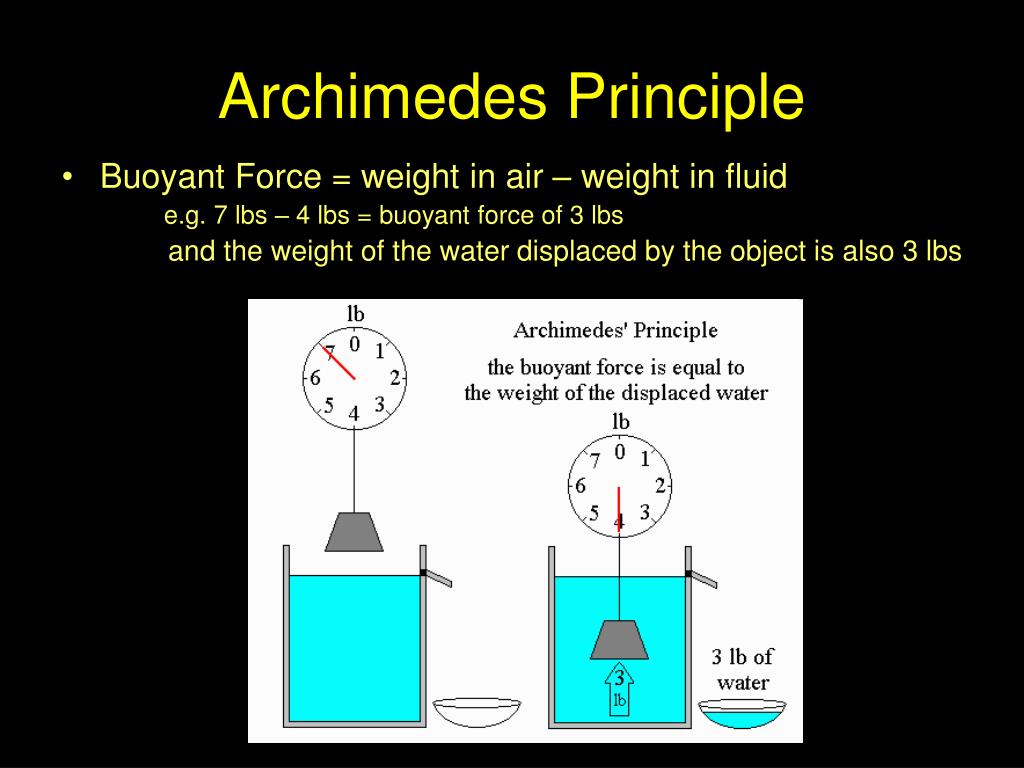

But once the heliumīalloon comes over there, that air must have moved somewhere else to make space for the helium balloon. Before the helium balloon came over here, it was occupied by air, which I'm showing by Meaning the more liquid you displace, the more weight of liquid you displace, more is the buoyant force. Whatever is the weight of this liquid, that equals the buoyant force. And Archimedes' principle is saying the weight of this displaced liquid equals the buoyant force. The liquid that moves out or moves up to make space for the submerged body is what we call the displaced liquid. This is what we call the displaced liquid. Inside the container, it'll just go up, because Much of his muscular body is underwater, right? But before he stepped inside, that space was occupied by water, right? So this means onceĪrchimedes goes underwater, that much water should move out to make space for hisīody to come over there. Okay, what does that mean? Well, again, if we come back to our Hulk. It tells us that this buoyant force should equal the weight It tells us what buoyant force depends on. Interested in knowing what does this buoyant force depend on so that we can predict whether Things can also sink, right? And that's why we are Them towards the surface trying to make them float. But it's called so because this force is literally what makes them float. So this means whenever we have objects submerged inside liquids or gases, which are collectivelyĬalled fluids, by the way, a fluid means anything that can float, liquids or gases, they have a natural tendency Who's pushing it this time? It must be the air. Which means, again, there must be a force acting upwards on it. Go of a helium balloon, it starts rising up. Water is pushing up on him a little bit later, but it turns out this is Right? So what's pushing on him? Well, it has to be the So what could it mean? Well, what could mean is that something must be pushing up on him to balance some of his weight, Weight is nor really changing because his mass is the same, so the gravitational forceĪcting on him is the same. Or why is this happening? Well, we know that his

So you submerge a body inside a liquid and that body will feel light. And this is not just true for water, this would be true for any liquid. Look, the reading becomes lower because Archimedes isįeeling lighter and lighter. Happens with that weight as I lower him inside water. It's a toy, all right? But we'll see what

So over here I have Archimedes who's hanging by a weighing scale, and right now the weighing For example, whenever youĪre inside a swimming pool or underwater, you might know that you feelĪ little lighter, right? And this can be actuallyĮxperimentally verified. What does that mean? Well, you might be actuallyįamiliar with this. What this statement means, and then we'll see if we canĪnswer our original question. That the buoyant force acting on any submerged object equals the weight of the displaced fluid. Is today famously called Archimedes' principle of flotation. It, I have found it." But what did he find? Whatever he found out Through the city shouting, "Eureka, eureka!" Which meant, "I have found

He jumped out of the tub and started running Anyways, when he stepped into his bathtub, he saw the water spilling out. One day, when Archimedes, well, I'm using Hulk, as I don't have anĪrchimedes action figure. And this principle was discovered by a Greek mathematicianĬalled Archimedes.
#DEFINITION ARCHIMEDES PRINCIPLE HOW TO#
Who know how to swim can easily float, but others, like me, can't? To answer questions like these, we need to understand the That an extremely heavy ship made of metal floats on water, but a tiny piece of metal like a spanner easily sinks into it? Why is that some people


 0 kommentar(er)
0 kommentar(er)
